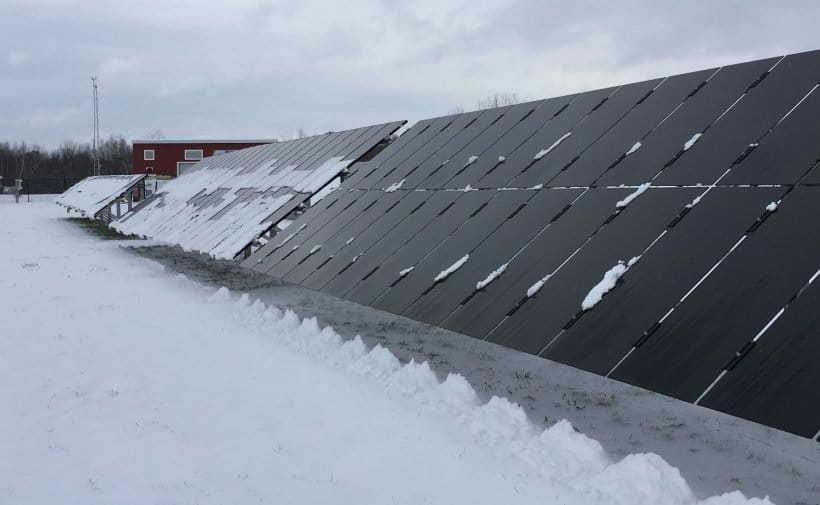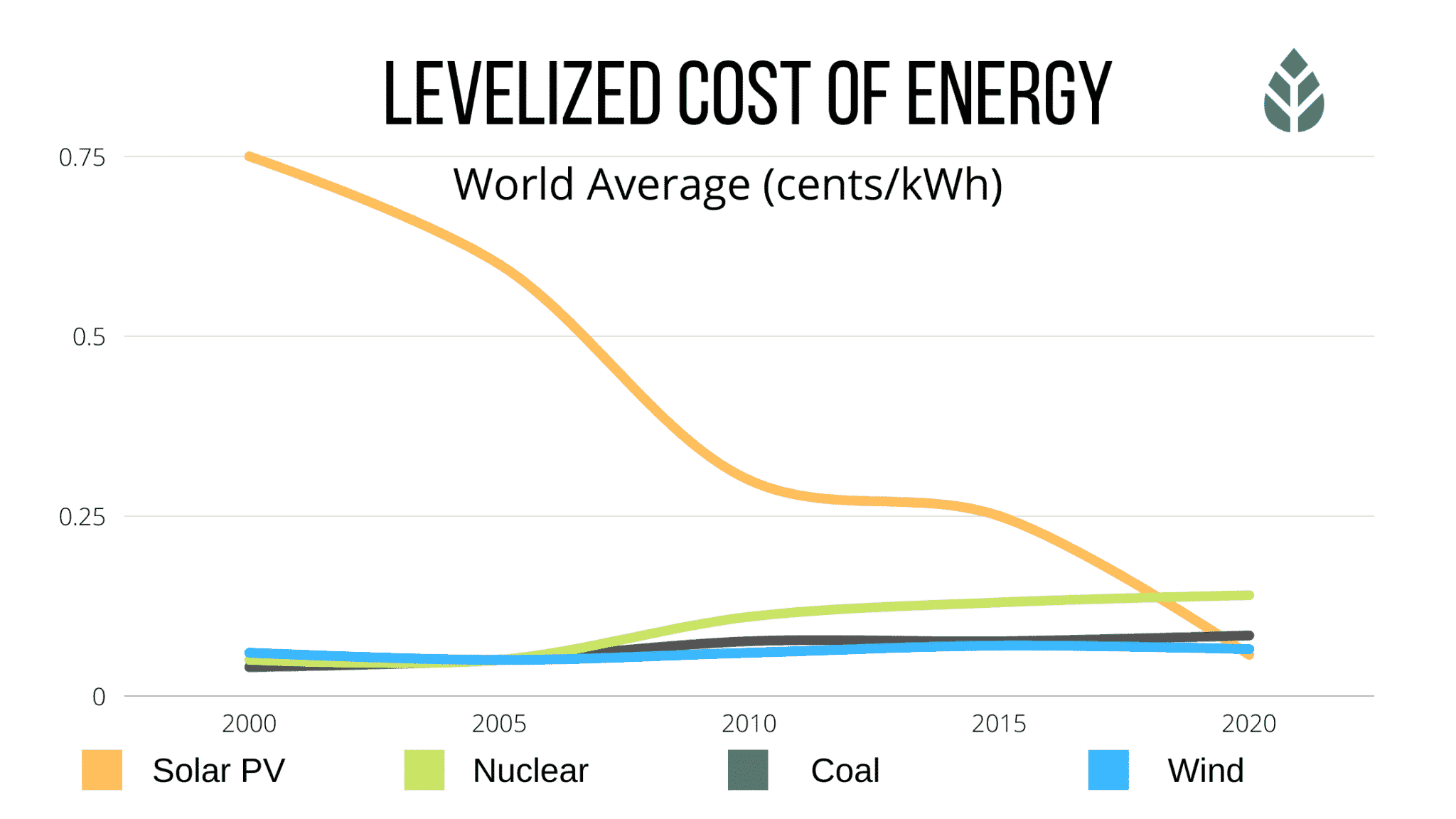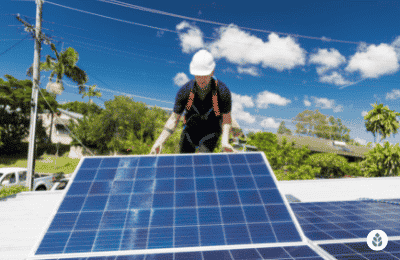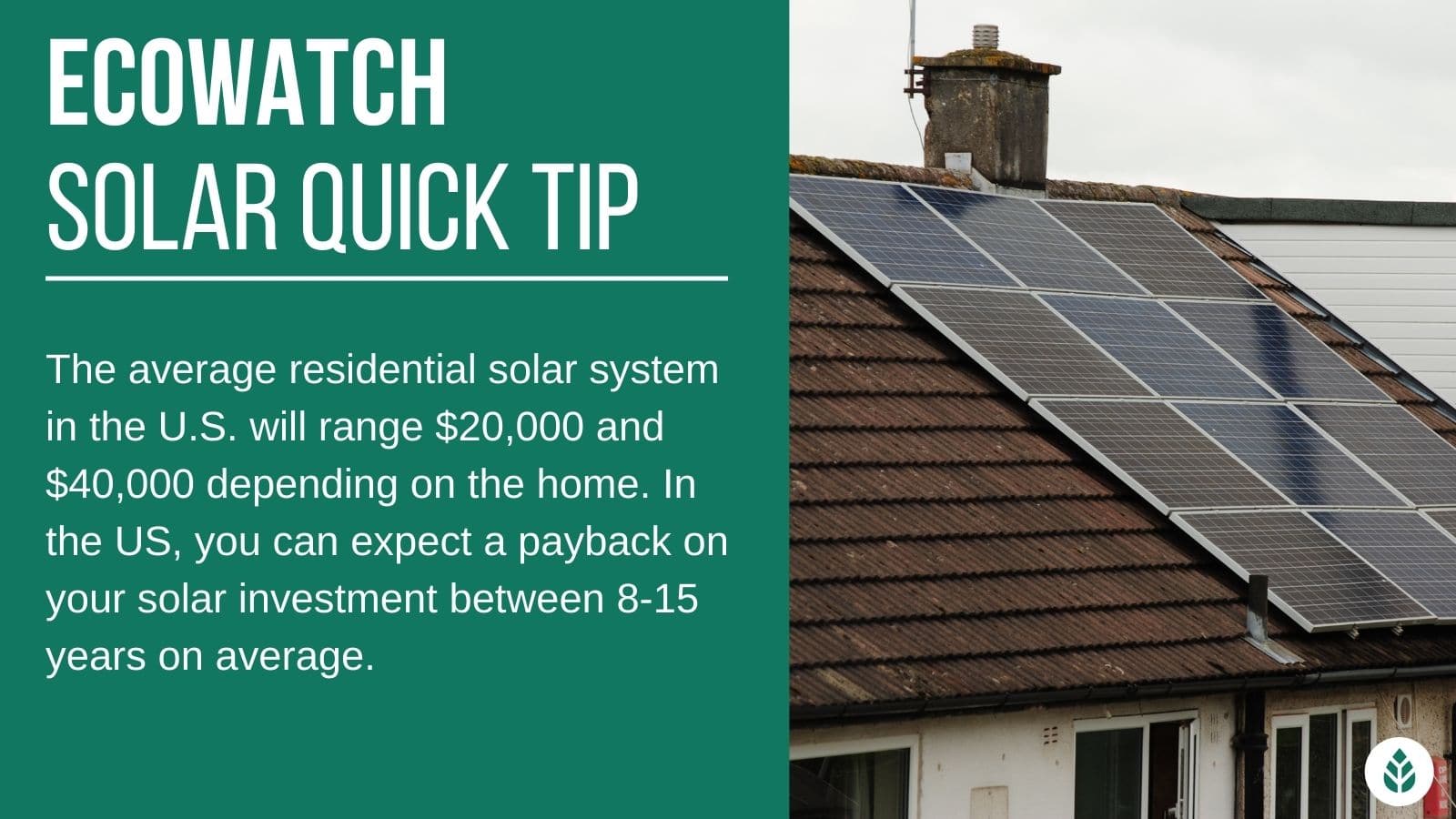 Reviews
Reviews
Are Solar Panels Worth It for Your Home? (2024 Buyer's Guide)
In this EcoWatch guide on whether solar panels are worth it, you’ll learn:
- When are solar panels NOT worth it
- What are the benefits of going solar
- How to maximize your ROI when going solar
- What to consider before going solar
This EcoWatch guide has helped thousands of homeowners make the right decisions for their home by providing them with factual, un-biased information on solar panels. Let’s get started!
Each product and or company featured here has been independently selected by the writer. You can learn more about our review methodology here. If you make a purchase using the links included, we may earn commission.
In this article, we’ll discuss whether solar is worth it for the majority of American homeowners, but whether you should go solar will ultimately depend on your home’s configuration and your energy needs. To speak with an EcoWatch-vetted professional who can help you determine whether solar is worth it for your home, follow the links below.
It has only been in the last year or two that renewable energy sources have officially become cheaper than fossil fuels. This is thanks to a phenomenal decade of reduced prices for solar; but what does that mean for the average homeowner?
In most cases, installing a rooftop photovoltaic solar panel system will offer greater lifetime value than staying connected to a conventional utility provider. However, that doesn’t mean that solar is the right choice for every homeowner.
Rather than try to sell you on solar like other commercial sites, in this article, we’ll take a closer look at who should, and should not go solar, and why. Data according to International Renewable Energy Association and OpenEI*

Blue Raven Solar
Pros
- Industry-leading in-house financing
- Competitive pricing
- Excellent reputation
Cons
- Doesn't offer solar batteries (coming 2022)

Blue Raven Solar
Pros
- Industry-leading in-house financing
- Competitive pricing
- Excellent reputation
Cons
- Doesn't offer solar batteries (coming 2022)
Watch Below: Pete was an early adopter of solar; he installed his solar system back in 2008. Fast forward to today – he explains whether he made the right choice for his needs.
What Factors Affect Whether Solar is Worth It?
Location will be the main factor deciding the potential value of solar for your home. This goes beyond just sunlight, and requires consideration of electricity rates, local policy and more.
Here’s a quick glance at the situations that tend to make solar worthwhile:
- You have high electricity bills.
- Your roof receives a lot of sunlight.
- You have sufficient surface area on your roof.
- Your roof faces south or west.
- Your state or city offers solar incentives, rebates or exemptions.
Energy Usage
Solar performs best on homes with high electricity bills because each kilowatt-hour (kWh) they offset is worth more — so assessing your energy consumption is the best place to start. If you don’t know how much electricity your home consumes, look at your most recent energy bill.
Under “billing period” you should see a figure labeled kilowatt-hour (kWh) used. If your home’s energy use is above 500 kWh per month, you’re likely a good candidate for solar. Since the average home in American consumes around 881 kWh per month, the large majority of homeowners will benefit from solar conversion.
Now in assessing the value solar poses for you, remember that a huge chunk of the price you’d pay for a solar installation will include time, labor and permits.
That essentially means there’s a minimum fee to hire the services of a solar installation company (if I had to guess, I’d say that’s just under $10,000).
We wouldn’t recommend that anyone whose electricity use is below 500 kWh per month invest in solar. That’s because the savings that a few solar panels would generate over years probably won’t cover the minimum fees of hiring a full-service solar contractor.
Your Roof’s Sun Exposure
Arguably the most important step in determining if solar is worth it for you is to evaluate your roof. South and west facing roofs are the best direction for solar panels, as these arrays will receive the most direct sunlight in the northern hemisphere. Your array will need direct sunlight for the majority of the day, especially during peak hours.
If your access to sunlight is blocked by neighboring buildings or trees — even for just a few hours of the day — your system’s efficiency could suffer. Irradiance maps offer a unique glimpse into the variations of how much sunlight roofs receive.
Your roof will also require sufficient space for a full array of solar panels. Keep in mind that a 5 kW system (around the minimum size) will require at least 15 panels, and rooftops with ill-placed obstructions like chimneys, skylights and vents will lower the amount of available space.
Check out the EcoWatch solar panel calculator tool that can help you calculate solar energy potential of your home.
Average Buy-Back Rates
During my time working for a solar company, net metering and buy-back rates were the most frequently overlooked consideration for customers deciding whether solar was worth it for them. Net metering (and energy policy generally) is complex, and we wouldn’t expect every reader to know the ins and outs — but we recommend having a general idea of your utility’s net metering policy and buy-back rate before consulting with a company.
Net metering is a billing arrangement in which the excess energy your solar energy system produces is measured by your utility company and subtracted from your monthly electricity bill. In other words, you pay for the “net” value of electricity you consume. Most states have some form of electricity buy-back programs, but the exact policy varies considerably state to state (even company to company).
The average buy-back rate in the U.S. would likely fall at around 75% of the retail value of your surplus electricity. In states where net metering is more favorable, you’ll receive a true one-to-one credit. In other states, utilities might buy your energy at wholesale rate (considerably lower than full retail rate), while some states lack net metering policies entirely.
If your state doesn’t offer net metering, you’ll miss out on a key benefit of home solar that would lower your return-on-investment (ROI). Purchasing a solar battery to maximize your system’s efficiency would be your next best move, but that won’t be feasible financially for every homeowner. Solar batteries give you effective one-to-one net metering. Instead of exporting electricity to the grid to earn credits for use later, you send excess energy to your battery and then call on those kWh for free when you need them rather than turning to the grid and paying for electricity.
We should mention that net metering policies are in decline across the country, with one of the largest negative changes being California switching to NEM 3.0. This new policy dropped the credit rate by around 75%, which instantly made new solar installations less beneficial. We expect that downward incentive trend to continue throughout other states, as well.
If that happens, solar will become less valuable overall. Most customers will need to install batteries to make it worthwhile and secure the shortest panel payback period possible. Batteries add between $10,000 and $20,000 to your installation costs in most cases, which means installation becomes much more expensive, and that cuts into your savings.
However, electricity rates are also on the rise throughout the U.S., and that trend is also expected to continue. So, despite having to pay more for solar in the future because of batteries, chances are a system will still make financial sense for most U.S. homeowners. Things will become a bit more complicated in the future, which is why going solar now and locking in your current net metering rate is the best decision you can make.
How Much Money Can Solar Panels Save You?
The average installation cost of a residential solar system in the U.S. will range $20,000 and $40,000 depending on the home. Here’s a quick look at the national averages, as calculated by our EcoWatch experts:
| Average 25-Year Cost of Energy Without Solar | Cost of Average Solar System Installation | Estimated Total Savings (25 Years) | |
| U.S. Average | $61,483 | $29,970 | $31,513* |
| State With Above-Average Electricity Costs (ex: California) | $70,000+ | $35,000 | $35,000+* |
| State With Below-Average Electricity Costs (ex: Montana) | $50,000 | $22,000 | $15,000* |
*Costs are estimates meant to show how the cost of electricity affects the value of solar panels.
So what’s the takeaway here? The minimum to go solar won’t vary tremendously — but if your electricity rates are low, your solar system may not generate enough energy savings to be as worthwhile. You should still have a reputable solar installer in your area complete a personalized assessment, though, as that’s the best way to determine how worthwhile solar is for your home.
Lower Taxes & Access to Other Incentives
Tax breaks, rebates and other various incentives vary significantly from state to state, but here’s what the average state might offer its taxpayers.
- State Tax Credit: Though only available in about 10 states at the moment, some offer additional tax credits against the price of installing a system.
- Property Tax Exemption for Solar: Without an exemption, the additional value of a solar energy system would add to the assessed value of your property, increasing your property taxes.
- Sales Tax Exemption for Solar: In many states, purchasing a solar energy system is exempt from the state sales tax. This can prevent an additional few thousand dollars worth of taxes in states where sales tax is high.
No matter what state you live in, you’re eligible to receive the federal solar tax credit of 30%. You may also hear this referred to as the federal investment tax credit (ITC).
Payback Period for Solar Panel Expenses
A solar payback period is the amount of time it takes to recoup one’s investment in a solar energy system. In the US, that figure sits around 11 years, on average and usually between 8 and 15 years.
Most solar proposals and calculators will provide this figure as part of an estimate. Of course, your payback period will depend on the amount of electricity your home requires, your local solar policy and your chosen solar financing method.
Most proposals and solar calculators provide figures based on estimates that customers are capable of purchasing a system — but as solar spreads into the mainstream, financing is becoming a more common way to cover the installation and upfront costs. When evaluating your payback period, be sure to factor in the interest rates on a solar loan.
It can be the difference of a few thousand dollars at least — usually around $5,000 over the lifetime of your loan. For this reason, unless you plan to purchase a system in cash, we don’t recommend going solar if your estimated payback period is 16 years or higher.
Solar Outlook in the U.S.
Despite supply chain challenges, solar forecasts remain robust. The U.S. Department of Energy’s Office of Energy Efficiency and Renewable Energy reports that “with aggressive cost reductions, supportive policies, and large-scale electrification, solar could account for as much as 40% of the nation’s electricity supply by 2035.” To put that into perspective, solar only accounted for 2.8% of total energy supply in 2021.1
Since the Inflation Reduction Act passed in 2022 under the Biden administration, the outlook for solar and other renewable energy in the U.S. has continued to improve. The federal tax credit was bumped up from 26% to 30% for all new solar installations and was extended through 2032. The revised federal tax credit also includes standalone energy storage.2 These policies have made solar more affordable for many families in the U.S.
What Are The Benefits of Going Solar?
At its best, solar allows you to reduce your carbon footprint, offset your monthly electric bills and increase your energy independence. With rising energy rates and the price of modern solar being as low as it is, doing nothing is usually more expensive than going solar. Here’s why:
Electricity Bill Savings
Electricity rates are trending up across the nation, and they show no signs of slowing down. By installing a solar power system, you’re essentially purchasing 25+ years of electricity upfront, thereby locking in your rates. That provides effective savings that total around $31,513, on average. This figure climbs higher as your electricity rates increase over the years, as well.
This allows solar customers to more accurately and confidently budget and plan long-term. Under the right conditions, the average U.S. homeowner can pay back their systems using those savings in just 11 years and then generate solar savings for another 14+ years that save upwards of $30,000 over the 25 year lifespan of their panels. The greater your energy rates without solar, the more an array will save you.

Home Resale Value Increase
We’re often asked if solar panels increase property value. Since a solar energy system is an asset just like any other, it does add to the value of your home.
However, this is only true if you own the system, rather than lease it.
A well known Zillow study shows us that homes with solar installations tend to sell for about 4.1% more than homes without.3 The value added will depend on the system size, quality and age of the installation.
Given the average home value in the U.S. (as of January 2024) of $342,685, that means an expected average increase in property value of $14,050, roughly half the pre-incentive cost of going solar and about 75% of the post-ITC cost.
As a bonus, if your state offers a property tax exemption for a solar installation, you won’t have to pay the additional property taxes on the boost in property value provided by solar.
Clean, Renewable Energy
The U.S. still generates over 60% of its energy from fossil fuels. Solar panels, though not without their own environmental challenges, are 96% less carbon intensive than coal and 93% less carbon intensive than natural gas.5
By making the switch to solar energy, you’re not only fighting climate change by offsetting the use of brown energy, but you’re also increasing the independence and resilience of your local community by relying less on traditional utilities.
What Should You Look Out For When Considering Solar?
An investment in a solar energy system is significant — and there are a number of important factors to consider before signing a contract. If you’ve decided solar is worth it for your situation, here’s what we recommend starting with.
Initial Installation and Ongoing Maintenance Expenses
Sticker shock is common in solar, especially for those advertised misleading marketing like “free solar panels” or “get paid to go solar.”
The upfront expense of solar panels can be expensive, but it’s important to remember that going solar is often cheaper than doing nothing. When considering the upfront solar investment, remember to compare it to what you might spend on electricity over the next 25 years without solar. Just remember that buying your panels with cash or a solar loan are the options that will bring you the most benefits and highest savings over time.
After installation, it’s also important to remember that there will be maintenance fees (such as replacing the inverter) that solar panel owners are responsible for.
Payback Period
A solar payback period is a great indicator of whether a solar photovoltaic system (PV system) will be worth it for you. Any reputable solar company will include pricing and an estimated payback period in your proposal. In most cases, a good payback period will sit between 8-15 years, with an average of around 11 years. If you get close to 20, solar may not be worth it for you because you’ll have less time after the system pays for itself to accrue savings within the panel lifespan.
Net Metering Policies
Net metering policies vary from state to state and utility to utility, so make sure to find out the details of your policy. Though it’s rare for a policy to be the make or break factor in your ROI, it’s an important consideration. If your state does not offer net metering as an incentive, you may want to think about investing in a battery.
Here are a few key terms that might help you understand your net metering policy:
- Retail rate: The full rate that utilities charge their customers.
- Wholesale rate: The rate at which electricity providers purchase their energy (lower than retail, think about this as electricity bought in bulk).
Remember that net metering policies are in decline across the country, so if you have net metering available to you — especially if it’s at the retail rate per kWh — you would benefit far more financially by going solar now and locking in that rate than you would if you waited.
Pending Policies & Changes to Incentives
The solar industry is young and still developing, so current state incentives and policies are subject to change. In some cases, it may benefit you to wait for more progressive policy, but in others it may hurt. In response to the success of solar and other renewables, some powerful energy companies are lobbying against net metering policies, putting some in jeopardy. For this reason, we don’t recommend waiting and seeing — and it’s best to do some research on the current state of solar incentives in your area.
Weather & Climate

As we’ve covered, solar panels perform best in regions with a lot of direct sunlight; this tends to be closer to the equator, but homes in northern states may still be a good fit for solar. It may seem counterintuitive, but solar panels are actually more effective in the cold when electricity flows faster.
Also, rain helps solar panels work more effectively. That’s because showers will wash away any dirt or grime that builds up on your panels in the dry seasons.
Many northern states are also home to some of the best solar incentives in the country. It’s still important to consider your climate for solar.
States which receive the most sunshine will yield the best efficiency, and solar panels will still generate about 10-25% of the electricity on cloudy days than they would with full sunshine.
Companies Pushing Solar Leases or PPAs
Some solar companies looking to quickly expand their business may advertise misleading messages about “getting paid to go solar” or “free solar panels.”
This is often another way of talking about a solar lease or a solar power-purchase agreement (PPA), many of which have sign-up promos to draw in customers on a quick sale.
Though solar leases and PPAs can certainly be a viable option for certain homes, purchasing a system, whether outright or through a loan, will offer much better savings over time. Keep in mind that leases and PPAs will likely become more valuable if net metering disappears in your area and leaves you with the $10,000 to $20,000 cost of solar batteries, but still, they won’t provide as much benefit as a cash purchase or solar loan.
Leases and PPAs can often come with strings attached as well, such as steep cancellation fees or complications with selling a home, so pay careful attention to your contract and the fine print before signing anything.
Wrap Up: Is Solar Worth It or Not?
Under the right conditions, solar is worth it for the average American homeowner in 2024. However, it’s not a one-size-fits all type of energy solution. Consider the following to assess if you’re a good candidate for solar:
- Access to sunlight: Does your roof have access to direct sunlight?
- Roof fit for solar: Does your roof face south or west? Does it have enough room for at least 15 solar panels?
- Existing electricity bills: If your bills are already below-average, a solar installation won’t provide as much value.
- Local policy: Does your state or utility offer a net metering program? If so, what is the buy-back rate?
Though these factors can help you get a good idea of whether solar is worth it, the best way to get an accurate estimate is through connecting a local solar company. A local provider can analyze your electricity patterns, use satellite imagery to draw up a model on your roof and provide resources on prices and financing options.
Additional Resources:
- Top 6 Solar Companies of 2024 (Ranked & Reviewed)
- Solar Panel Cost In 2024 [Homeowner’s Installation Savings Guide]
- 2024 Solar Incentives and Rebates (Top 10 Ranked States)
- Federal Solar Tax Credit: A Homeowner’s Guide
The cost information presented in this article is derived from a comprehensive analysis, incorporating data from multiple industry sources. The average cost per watt per state was calculated based on figures from Consumer Affairs, Energy Sage, and Berkeley Lab’s Electricity Markets & Policy Department. Additionally, monthly energy consumption and the average monthly cost of electricity were sourced from the U.S. Energy Information Administration, ensuring a well-rounded and accurate representation of the information presented.
FAQs: Are Solar Panels Worth It?
Here are some common questions we receive from readers assessing whether solar is worth it for them.
In the United States, the average solar panel payback period is 11 years, and most systems pay for themselves in between 8 and 15 years. In states where electricity is more expensive, solar panels will pay for themselves more quickly. Climate, local policy and your chosen financing method will also play a large role in determining your payback period.
In most cases, switching to solar will save you money when compared to maintaining a connection with your public utility provider. However, this won’t be the case with every home, and we encourage our readers to consult with a local installation company to get a detailed estimate.
Solar panel installations increase property value across the country. However, it’s worth noting that this is only the case if you own your solar array rather than lease it. In broad strokes, the amount of value increased will correlate with the amount of savings a new homeowner would expect to see over the remainder of the array’s lifetime.
Are Solar Panels Worth It In Your State?
- Are Solar Panels Worth it In Alabama
- Are Solar Panels Worth it In Arizona
- Are Solar Panels Worth it In California
- Are Solar Panels Worth it In Colorado
- Are Solar Panels Worth it In Connecticut
- Are Solar Panels Worth it In Delaware
- Are Solar Panels Worth it In Florida
- Are Solar Panels Worth it In Georgia
- Are Solar Panels Worth it In Hawaii
- Are Solar Panels Worth it In Illinois
- Are Solar Panels Worth it In Kentucky
- Are Solar Panels Worth it In Louisiana
- Are Solar Panels Worth it In Maryland
- Are Solar Panels Worth it In Massachusetts
- Are Solar Panels Worth it In New Jersey
- Are Solar Panels Worth it In New York
- Are Solar Panels Worth it In North Carolina
- Are Solar Panels Worth it In Texas
- Are Solar Panels Worth it In Utah
- Are Solar Panels Worth it In Virginia
Comparing authorized solar partners
-
- Industry-leading in-house financing
- Competitive pricing
- Excellent reputation
- Doesn't offer solar batteries (coming 2022)
A+Best Solar Financing2014Trina Solar, Canadian Solar, SolarEdge, Silfab, SunPower25-year manufacturer warranty; 10-year workmanship warranty, 2-year production guarantee
Having trouble deciding? Click below and use our process to receive multiple quotes instead:

 233k
233k  41k
41k  Subscribe
Subscribe 










